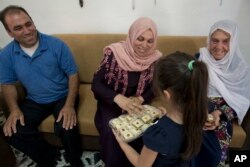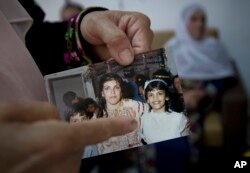The Michigan primary victory of Rashida Tlaib, a Palestinian-American who is expected to become the first Muslim woman to serve in the U.S. Congress, triggered an outpouring of joy in her ancestral village on Wednesday.
Relatives in Beit Our al-Foqa, where Tlaib's mother was born, greeted the news with a mixture of pride and hope that she will take on a U.S. administration widely seen as hostile to the Palestinian cause.
“It’s a great honor for this small town. It’s a great honor for the Palestinian people to have Rashida in the Congress,” said Mohammed Tlaib, the village’s former mayor and a distant relative. “For sure she will serve Palestine, for sure she will serve the interests of her nation. She is deeply rooted here.”
Rashida Tlaib, a former state lawmaker, defeated five other candidates to win the Democratic nomination in her Michigan district in Tuesday’s primary. She will run unopposed, setting her up to take the spot held since 1965 by John Conyers, who stepped down in December citing health reasons amid charges of sexual harassment.
While celebrating her win, Tlaib was embraced early Wednesday morning by her mother, Fatima, who briefly wrapped a Palestinian flag around Tlaib’s waist. “My mom is really, genuinely excited,” Tlaib said of her victory.
The eldest of 14 children born to Palestinian immigrants in Detroit, the 42-year-old Tlaib advocates progressive positions associated with the Bernie Sanders wing of the Democratic Party, such as universal health care, a higher minimum wage, environmental protection and affordable university tuition.
As a state lawmaker, she sought to defend Detroit’s poor, taking on refineries and a billionaire trucking magnate who she accused of polluting city neighborhoods. On the campaign trail, she criticized the influence of “big money” on politics and took aim at President Donald Trump, whom she famously heckled in 2016 while he was delivering a speech in Detroit.
While noting her Palestinian heritage, her website makes no mention of her views on the Israeli-Palestinian conflict. In a 2016 op-ed explaining why she disrupted then-presidential candidate Trump, she described herself as an “American, parent, Muslim, Arab-American, and woman.”
In an interview on Wednesday, Tlaib said her grandfather emigrated from Palestine to Brazil during the U.S. depression and eventually moved to Detroit to find better opportunities. “My dad grew up in Jerusalem,” she said. “When he was 19, he joined his father here. At 27, my grandmother grabbed him by the ear and took him to Palestine and said, ‘You are going to marry a good Arab woman.’”
While Tlaib would be the first Muslim woman to occupy a seat in the U.S. Congress, she would not be the first Palestinian-American. A lawmaker from western Michigan, U.S. Rep. Justin Amash, a Republican, is the son of a Palestinian refugee father and Syrian immigrant mother. He is a Christian.
In the West Bank, family members were jubilant as news of Tlaib’s victory came in early Wednesday. Relatives served baklawa, a sweet pastry, and grapes, figs and cactus fruits from their garden to visitors celebrating her win.
Tlaib’s uncle and aunt were speaking on an iPad with her mother, Fatima, back in Michigan.
“Thank God. Thank God,” her mother said. “This is for the Arabs and Muslims all over the world.”
She said her daughter detests Trump and that “God willing” she will defeat him and become the next U.S. president. “She stood up to him during his campaign. God willing, she will do it again and win.”
The first visitor was Mohammed Tlaib, the former mayor, who predicted his 5-year-old daughter, Juman, will grow up to be like her famous American relative. “Look at her. She is beautiful, smart and strong like her. From now on, I will name her Rashida,” he said.
The family’s story is typical of many Palestinians, with relatives scattered across the West Bank, Jordan and the United States. Mohammed Tlaib said some 50 people from the small village have immigrated to the U.S. and now have children in schools and universities in America. Relatives said Tlaib’s late father was from east Jerusalem.
“They are Americans, like other Americans, and have deep roots here. So we expect them to serve their occupied and embattled country there,” he said.
Trump is widely loathed by the Palestinians following his decision last December to recognize Jerusalem as Israel’s capital.
The Palestinians, who seek the West Bank, east Jerusalem and the Gaza Strip for an independent state, see Trump as unfairly biased toward Israel. They have cut off most contacts with the Trump administration and pre-emptively rejected a peace plan expected to be unveiled by the White House in the near future.
The Tlaib family home in the West Bank is located near Road 443, an Israeli highway cutting through the territory that is largely off limits to Palestinian motorists. The home is near a towering military checkpoint, and relatives said that like many Palestinians, they are unable to build on their property because Israel will not give them a construction permit.
Rashida Tlaib’s uncle Bassam, 54, said the family always believed she had a bright future and has high hopes for her career in Washington.
“She told the family that she wants to run for election to defend human rights, women rights, immigrant rights and the Palestinian rights,” he said, adding that the Democrats are much better for the Palestinians than the Republicans. “There is a space in the Democratic party to defend Palestinian issues,” he said
Her aunt, Fadwa Tlaib, who was visiting from Jordan, described her niece as a strong advocate for the weak. “She hates to see anyone take the rights of others. She supports human rights, women’s rights. She empowered girls in the family,” she said.
She said that Rashida Tlaib is part of a new, more powerful and politically involved generation of Palestinian-Americans who are better educated and integrated than their immigrant parents.
“Our kids are having better opportunities, better educations, here and in the U.S., and they have a much brighter and more influential future,” she said.






